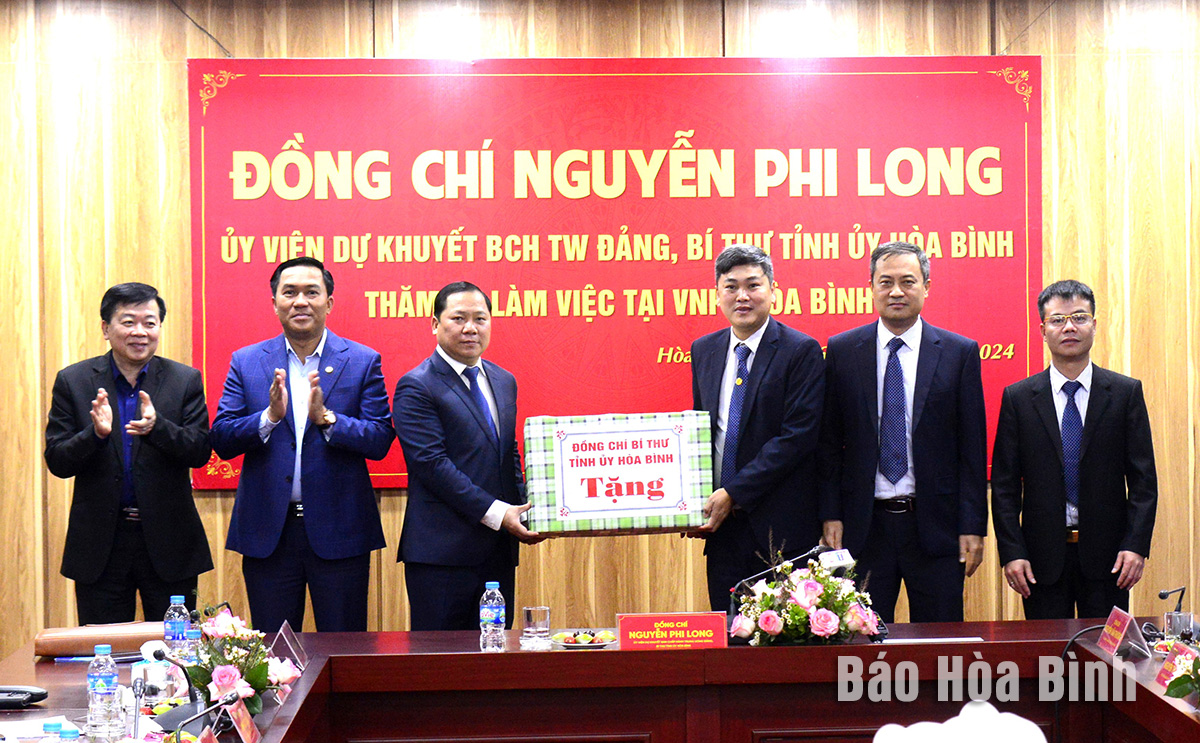
A working delegation led by Nguyen Phi Long, alternate member of the Party Central Committee and Secretary of the provincial Party Committee, paid a working visit to the Vietnam Posts and Telecommunications Group’s Hoa Binh branch (VNPT Hoa Binh) on January 16.
Nguyen Phi Long, alternate member of the Party Central Committee and Secretary of the provincial Party Committee, gives New Year gifts to VNPT Hoa Binh.
VNPT Hoa Binh continues to affirm its key role as a strong enterprise in the field of telecommunications and information technology, and as the leading unit in implementing the digital transformation programme. Last year, its revenue reached 334 billion VND (13.6 million USD), equal to 100.84% of the group's plan, and up 6.01% compared to that in 2022. It contributed 11.9 billion VND to the provincial state budget, ranking 10th out of 63 provinces and cities; and ensured stable jobs and income for 366 labourers.
In recent years, VNPT Hoa Binh has focused on expanding and renovating its network, improving customer care, optimising coverage areas, eliminating signal depressions, increasing service quality and meeting information and communication works in all situations, thus serving the direction and management of Party committees and authorities at all levels, as well as the needs of using telecoms and IT services of local people.
Acknowledging VNPT Hoa Binh’s achievements, Long emphasised its role in implementing the province's strategic breakthroughs such as infrastructure investment, administrative reform, and human resources development.
He asked the Party organisation and leaders of VNPT Hoa Binh to focus on the Party building work, well implement regulations of the Party Central Committee and the provincial Party Committee on Party development in State-owned enterprises, and pay attention to increasing the number and quality of Party members.
It is necessary to invest in infrastructure development; coordinate with the group to improve the quality of infrastructure to meet the requirements of local political tasks; complete and enhance essential services for local people to ensure all of them gain access to services; and develop digital applications, he stressed.
Hoa Binh province is undergoing a dynamic transformation amid Vietnam’s national digital transition. Building on Poliburo’s Resolution No. 57-NQ/TW on breakthroughs in science, technology, innovation, and national digital transformation, the province has rolled out a wide range of practical action plans. A standout initiative is the "Digital Literacy for All” movement, an effort to ensure that no one is left behind in the digital era.
Hoa Binh province is undergoing a dynamic transformation in the wake of the national digital transformation movement. Building on Resolution No. 57-NQ/TW of the Politburo on breakthroughs in science, technology, innovation, and national digital transformation, the province has implemented a wide range of practical action plans. A standout initiative is the "Digital Literacy for All” movement ambitious effort to ensure that no one is left behind in the digital age.
With a spirit of unity and proactive problem-solving, the Party Committee, the government and the people of Dong Lai Commune (Tan Lac District) have made great strides in implementing the resolutions of the 24th Party Congress of the commune for the 2020 - 2025 term. Focusing on leadership and practical actions, the commune has brought the Party’s resolutions into daily life, creating strong impacts and pushing the local development forward.
Amid the nationwide push for digital transformation, young people in Hoa Binh Province are stepping up as dynamic pioneers, applying technology to enhance Youth Union operations and expand the reach of youth-led initiatives. Through creativity and adaptability, Youth Union organizations at all levels have introduced a series of practical solutions, contributing to modern governance and community development.
In recent years, An Nghia commune, located in Lac Son district, has stepped up administrative reform, focusing on improving the quality and efficiency of its single-window service unit for receiving and processing administrative procedures. These improvements have helped create favourable conditions for local residents and organisations to handle administrative procedures, contributing to the commune’s broader socio-economic development.
The Prime Minister-approved master plan to develop the multi-use value of forests ecosystems through 2030, with a vision to 2050, aims to improve the management and sustainable use of forest resources, create jobs, increase incomes, and improve the living standards of ethnic minorities, people in mountainous and remote areas, forest workers and those living near forests.



